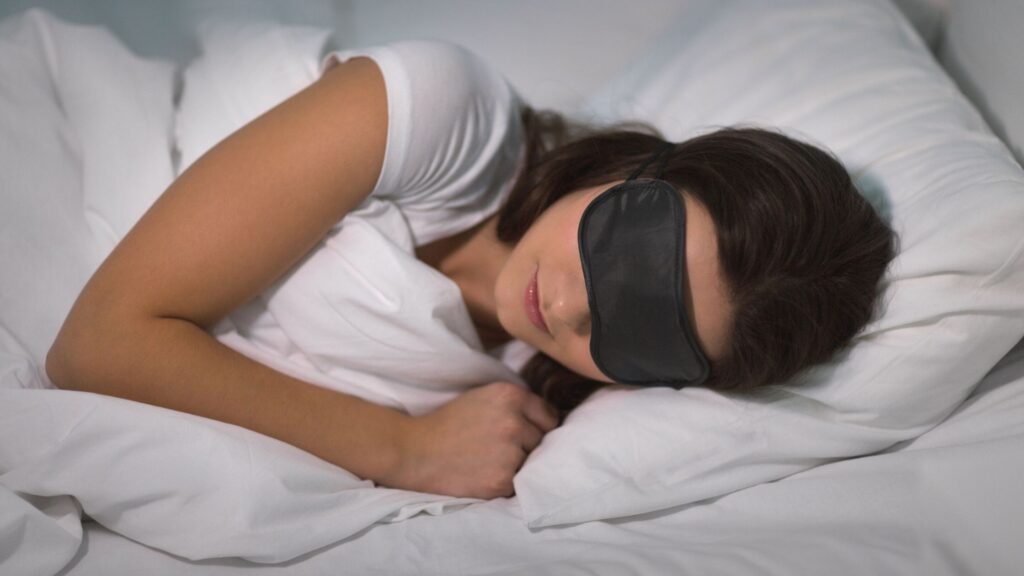
100 NIGHT MONEY BACK GUARANTEE
FREE SHIPPING ON ORDERS OVER $75
OVER 9,500 ORDERS - STORE RATING 4.9/5
WE GUARANTEE YOUR BEST SLEEP

Eye masks are often overlooked accessories. However, scientific research suggests that sleep masks, which cover your eyes to block out light while you sleep, help you sleep. Experts also recommend them to relieve certain painful illnesses, such as migraines and dry eyes. Sleep masks can also help your appearance by protecting the skin around the eyes and reducing puffiness.
Furthermore, by understanding the purposes and features of sleep or eye masks, you may determine if they will best suit your overnight requirements. Eye masks aren’t exactly new or exciting, but they may be just what you need to get some much-needed rest.
This article will discuss the reasons why you should consider purchasing an eye mask and how they might be able to assist you in maintaining your natural sleep cycles and catching up on some much-needed beauty sleep.
Specific eye masks have anti-aging properties if you’re concerned about wrinkles around your eyes. Contact with your pillow while sleeping without a mask might strain the skin around your eyes. Some sleep masks, consisting of silk or other extra-soft fibres like bamboo, provide a soothing caress to this area of your face.
Eye masks can also help with a common morning problem, puffiness or bags around the eyes. This tends to happen if you don’t get enough sleep. Therefore a mask can help by ensuring that you get more sleep.
Light plays a vital role in managing your body’s circadian rhythm, the biological clock that determines when you sleep and when you wake up.
However, we are bombarded with artificial light in today’s world, which alters our sleep patterns. Even if we try to keep our rooms as dark as possible, light from the street or neighbouring rooms has a habit of getting in. As a result, our bodies receive mixed signals from the outside world, and our sleep suffers.
Sleep masks eliminate these issues with intrusive light by providing the complete darkness you need for a good night’s sleep. They can create a pitch-black environment in the brightest bedrooms by sitting flush over your eyes.
Everyone has the habit of feeling compelled to check their phones seconds after crawling into bed. According to studies, bedtime scrolling can spoil sleep quality by making it more difficult to fall asleep and achieve proper rest.
The ultimate remedy to this is an eye mask. You create a barrier between yourself and your smartphone by putting it on when you get into bed. While you can remove your eye mask and check your phone, this additional barrier can be surprisingly beneficial.
Sleep masks can also help with another problem that arises when you wake up in the middle of the night and check the time. Staring at the clock will add to your annoyance at having to get up and your anxiety about the day ahead. An eye mask encourages you to return to sleep by filtering out irrelevant distractions.
Dry eyes are another source of discomfort. And those who suffer from chronic dry eyes understand how inconvenient mornings may be.
Your eyes may be exposed to dry air, dust, and other irritants overnight. Eye masks provide a protective layer around your eyes as you sleep, allowing you to wake up without being bothered.
Planes, trains, and vehicles aren’t exactly ideal for sleeping. Even amid the craziness of the coach, sleep masks can go a long way towards creating your sleep sanctuary. Light is especially prevalent in plane cabins, drastically disrupting our sleep patterns. Block off the light coming in through windows and screens and get the rest you need to arrive well-rested.
Even the smallest amount of light can be terrible for people suffering from migraines. Light sensitivity is a typical symptom of migraines, which can be more bothersome if they occur during the day.
Sleep masks give you the complete darkness you need when a migraine strikes. Some masks have cooling or heating elements that help relieve migraine symptoms. Many migraine sufferers swear by frozen or refrigerated masks, which use the cold to calm the pounding effects of headaches.
Consider the material when selecting an eye mask. If you’re allergic to synthetic fabrics, choose a non-irritating or hypoallergenic fabric like bamboo. The bamboo fibre at Bamboo Haus is toxin-free and OEKO-TEX certified.
Set aside some time once you’ve acquired a sleep mask to adjust. If you’ve never worn one before, the sensation of having your eyes covered may be unsettling. Give yourself at least a week to use your new sleep mask by wearing it regularly. If it still doesn’t feel right, try another option to address your issues.
A good night’s sleep is likely to follow once you’ve found the perfect sleep mask. The correct sleep mask could be the key to getting a good night’s sleep and reaping all of the health advantages that come with it.